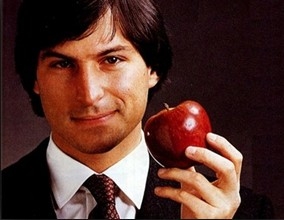He was not particularly philanthropic. He briefly set up a foundation, but he discovered that it was annoying to have to deal with the person he had hired to run it, who kept talking about “venture” philanthropy and how to “leverage” giving. Jobs became contemptuous of people who made a display of philanthropy or thinking they could reinvent it. Earlier he had quietly sent in a $5,000 check to help launch Larry Brilliant’s Seva Foundation to fight diseases of poverty, and he even agreed to join the board. But when Brilliant brought some board members, including Wavy Gravy and Jerry Garcia, to Apple right after its IPO to solicit a donation, Jobs was not forthcoming. He instead worked on finding ways that a donated Apple II and a VisiCalc program could make it easier for the foundation to do a survey it was planning on blindness in Nepal.
乔布斯并不是一个特别乐善好施的人。他曾短暂地创立过一个基金,但发现他雇来管理基金的那个家伙十分烦人,总是谈及做慈善的新方法以及如何运用捐赠。乔布斯开始轻视那些总是把慈善挂在嘴上或是认为自己可以彻底改变慈善事业的人。早些时候,他曾悄悄送出一张5000美元的支票,帮助成立拉里·布里连特的塞瓦基金会(SevaFoundation),该基金会致力于帮助穷人对抗疾病,乔布斯甚至同意了加入其董事会。但在一次会议上,乔布斯与董事会中一位著名的医生发生了争执,乔布斯认为基金会应该雇用里吉斯·麦肯纳来帮助筹款以及公关事务,但这位医生提出了异议。这次争议以乔布斯在停车场痛哭流涕结尾。第二天晚上,在感恩而死乐队为塞瓦基金会举办的慈善音乐会的后台,乔布斯与布里连特重归于好。然而,在苹果完成IPO之后,布里连特带着几位董事会成员——包括维维·格里维(WavyGravy)和杰里·加西亚(JerryGarcia)——来到苹果公司募集善款的时候,乔布斯并没有满足他们。相反,他努力说服他们,自己之前捐赠的一台AppleII和VisiCalc程序可以帮助基金会简化他们计划中的针对尼泊尔民众失明情况的调査。
His biggest personal gift was to his parents, Paul and Clara Jobs, to whom he gave about $750,000 worth of stock. They sold some to pay off the mortgage on their Los Altos home, and their son came over for the little celebration. “It was the first time in their lives they didn’t have a mortgage,” Jobs recalled. “They had a handful of their friends over for the party, and it was really nice.” Still, they didn’t consider buying a nicer house. “They weren’t interested in that,” Jobs said. “They had a life they were happy with.” Their only splurge was to take a Princess cruise each year. The one through the Panama Canal “was the big one for my dad,” according to Jobs, because it reminded him of when his Coast Guard ship went through on its way to San Francisco to be decommissioned.
乔布斯最大的一次个人赠与是送给自己的父母——保罗·乔布斯和克拉拉·乔布斯的,他送出了价值约75万美元的股票。老两口出售了其中一部分,用以偿还洛斯阿尔托斯的房子的抵押贷款,他们的儿子也回到家中庆祝。“这是他们人生中第一次没有背负贷款,”乔布斯回忆道,“他们请来了少数几个朋友,到家中开派对,那场面太温馨了。”但他们并没有考虑换一套好点儿的房子。“他们对那个没有兴趣,”乔布斯说,“他们对现在的生活很满意。”他们唯一的奢侈举动就是每年都乘坐公主号游轮度假一次。据乔布斯说,穿越巴拿马运河的那条航线是“我爸爸的最爱”因为会让他想起自己在海岸警卫队的时候,他们的船穿越巴拿马运河驶往旧金山退役的情景。
With Apple’s success came fame for its poster boy. Inc. became the first magazine to put him on its cover, in October 1981. “This man has changed business forever,” it proclaimed. It showed Jobs with a neatly trimmed beard and well-styled long hair, wearing blue jeans and a dress shirt with a blazer that was a little too satiny. He was leaning on an Apple II and looking directly into the camera with the mesmerizing stare he had picked up from Robert Friedland. “When Steve Jobs speaks, it is with the gee-whiz enthusiasm of someone who sees the future and is making sure it works,” the magazine reported.
苹果公司的成功给乔布斯带来了名声。1981年10月,《企业》(Inc.)成为了第一家将乔布斯搬上封面的杂志。“这个人永久改变了商业世界。”杂志上如此宣称。封面上的乔布斯留着修剪整齐的胡子,时髦的长发,穿着牛仔裤和白衬衫,还有一件有点过于光滑的西服。他靠在一台AppleII上,用他从罗伯特·弗里德兰那里学来的迷人眼神直视着镜头。杂志写道;“史蒂夫·乔布斯说话的时候是极富热情的,他能预见未来,也正在努力创造未来。”
Time followed in February 1982 with a package on young entrepreneurs. The cover was a painting of Jobs, again with his hypnotic stare. Jobs, said the main story, “practically singlehanded created the personal computer industry.” The accompanying profile, written by Michael Moritz, noted, “At 26, Jobs heads a company that six years ago was located in a bedroom and garage of his parents’ house, but this year it is expected to have sales of $600 million. . . . As an executive, Jobs has sometimes been petulant and harsh on subordinates. Admits he: ‘I’ve got to learn to keep my feelings private.’”
接下来是《时代》杂志,它在1982年2月推出了一个关于年轻企业家的专题报道。封面上是一幅乔布斯的画像,依然带着他极富魅力的眼神。故事中写道,乔布斯“实际上单独开创了个人电脑产业。”由迈克尔·莫里茨撰写的人物简介中写道:“6年前,这家公司还窝在乔布斯父母家中的卧室和车库里,在他的带领下,该公司有望在今年实现6亿美元的销售额,而乔布斯才不过26岁……作为管理人员,乔布斯有时候对待下属是脾气暴躁、严苛无情的。他自己也承认:‘我得学会如何控制自己的情绪。’”
Despite his new fame and fortune, he still fancied himself a child of the counterculture. On a visit to a Stanford class, he took off his Wilkes Bashford blazer and his shoes, perched on top of a table, and crossed his legs into a lotus position. The students asked questions, such as when Apple’s stock price would rise, which Jobs brushed off. Instead he spoke of his passion for future products, such as someday making a computer as small as a book. When the business questions tapered off, Jobs turned the tables on the well-groomed students. “How many of you are virgins?” he asked. There were nervous giggles. “How many of you have taken LSD?” More nervous laughter, and only one or two hands went up. Later Jobs would complain about the new generation of kids, who seemed to him more materialistic and careerist than his own. “When I went to school, it was right after the sixties and before this general wave of practical purposefulness had set in,” he said. “Now students aren’t even thinking in idealistic terms, or at least nowhere near as much.” His generation, he said, was different. “The idealistic wind of the sixties is still at our backs, though, and most of the people I know who are my age have that ingrained in them forever.”
尽管已经名利双收了,但乔布斯还是把自己看做一个反主流文化的孩子。有一次访问斯坦福大学的课堂时,他脱下了自己的威尔克斯·巴什福德西装和鞋子,坐在桌子上,盘腿打坐。学生们问了一些诸如苹果的股价何时会上涨之类的向题,乔布斯一概置之不理,而是开始讲对于未来产品的激情,比如某一天造出一台和书本一样小的电脑。渐渐地,不再有人问商业方面的问题了,乔布斯开始向这些衣冠整齐的学生们提问。“你们中还有多少人是处男处女?”他问道。下面有人不安地傻笑。“你们中有多少人尝试过迷幻药?”笑声更大了,只有一两个人举起了手。后来,乔布斯抱怨这一代的孩子,在他看来,这群孩子比他那一代的人更加物质主义,一心追求名利。“我上学的时候,60年代的那股思潮刚过,实用主义、目的性很强的社会风气还没有盛行他说,“现在的孩子根本不愿意用理想主义的方式来思考,连接近理想主义都谈不上。他们自然不会让现今的任何哲学问题占用他们太多的时间,因为他们要忙于学习自己的商科专业。”他说,自己那一代人就不一样。“60年代的理想主义之风仍然影响着我们,我认识的与我年龄相仿的人中,大多数人的心里都永远打下了理想主义的烙印。”——
注释:
①美国的一个教派,其教徒共同生活,生活方式很简朴。













